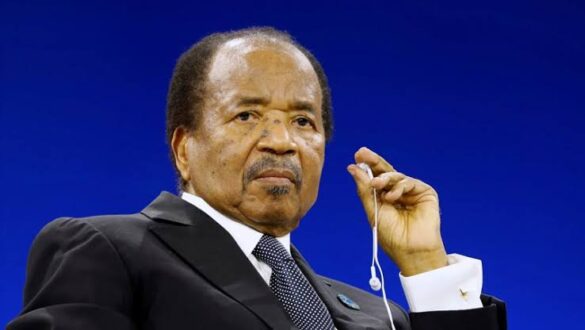Paul Biya was born on February 13, 1933, in Mvomeka’a, Yaoundé, to Etienne Mvondo Assam and Anastasie Eyenga Elle in French Cameroon.
After completing his primary education, he attended seminary schools until 1954 and then Lycée Général Leclerc in Yaounde, graduating in 1956.
Biya pursued higher education in France in political science and law and returned to Cameroon after its independence in 1960. He married Jeanne-Irène Atyam in the early 1960s; she passed away in 1992. He remarried in 1994 to Chantal Vigouroux and has three children.
Throughout the 1960s, Biya held various government positions in Cameroon. In June 1975, he became Prime Minister under President Ahmadou Ahidjo.
When Ahidjo unexpectedly resigned in November 1982, Biya, as Prime Minister, succeeded him constitutionally and was sworn in as president on November 6, 1982. Ahidjo remained head of the Cameroon National Union, UNC, the country’s only political party at the time. Initially, the transition was amicable, but tensions soon arose as Ahidjo sought to maintain influence over the government.
He was ultimately forced to resign as party chairman in August 1983, and the following month, Biya was elected to head the UNC at an extraordinary party congress.
Biya was reelected as president in 1984 and 1988, during which he was the sole candidate. Despite this apparent support, an unsuccessful coup attempt in April 1984 raised suspicions of Ahidjo’s involvement.
The following year, Biya dissolved the UNC at the party congress and formed the Cameroon People’s Democratic Movement, CPDM, of which he also became the leader.
While Biya initially supported democratic reforms, he reversed this stance after the 1984 coup attempt. Under domestic and international pressure, he eventually allowed some reforms in the 1990s. The country held its first multiparty elections in 1992, where Biya won reelection, followed by further victories in 1997 and 2004, despite noted irregularities.
After a consultative process that began in 1993, a new Constitution was implemented in 1996. A controversial amendment in April 2008 abolished presidential term limits, allowing Biya to run again. He was reelected in 2011 and 2018, with opposition parties alleging electoral fraud.
Biya inherited a struggling economy, impacted by declining global commodity prices in the 1980s, compounded by corruption and mismanagement. Although he accepted an International Monetary Fund structural adjustment programme in 1987, Cameroon entered a severe recession. In 2006, Biya established an anti-corruption commission, which had some success, but corruption remained widespread.
Under Biya’s long presidency, Cameroon faced several crises, including the 1990s and 2000s dispute with Nigeria over the oil-rich Bakassi Peninsula, which was awarded to Cameroon by the International Court of Justice in 2002. The rise of Boko Haram, a militant group from Nigeria, further challenged national security, prompting Biya to collaborate with regional leaders in 2014 to combat the insurgency.
A significant issue during Biya’s rule has been the growing discontent among the English-speaking minority in the Northwest and Southwest regions, who feel marginalised by the French-speaking majority.
The multiparty political environment of the 1990s allowed Anglophones to advocate for change, leading to tensions that erupted in strikes and protests in late 2016. Though Biya made some conciliatory gestures, they failed to quell unrest.
In 2017, Anglophone separatist leaders declared independence for the two English-speaking regions, resulting in armed conflict with government forces.
Biya launched a national dialogue in 2019, resulting in a special status designation for the English-speaking regions. However, this was criticised for lacking community input and providing limited autonomy, leading to ongoing dissatisfaction and conflict.
Throughout his presidency, Biya’s limited public presence has been a point of concern, compounded by his frequent overseas trips, particularly to France and Switzerland. As he and his long-serving Ministers age, worries about the lack of a clear succession plan have intensified.
Rumors of Biya’s ill health emerged in October 2024 when he was absent from public view and missed significant events. The government initially denied these rumors but later sought to quell speculation after he appeared in public later that month.
In July 2025, the 92-year-old Biya announced his candidacy for reelection in the October 12 presidential election. This election was seen as potentially different due to concerns over his age and health, as well as widespread dissatisfaction with economic conditions.
Notable challengers included long-time allies Bello Bouba Maigari and Issa Tchiroma Bakary, while primary opponent Maurice Kamto was disqualified.
Despite a relatively peaceful election day, unrest followed as opposition supporters accused the government of election rigging. On October 27, the Constitutional Council announced Biya’s victory with 53.66 percent of the vote.
On November 6, 2025, Biya was sworn in for an eighth term, reinforcing his status as the oldest serving ruler and one of the longest-serving heads of state globally.
By Nadege Dzilamonyuy Limnyuy

